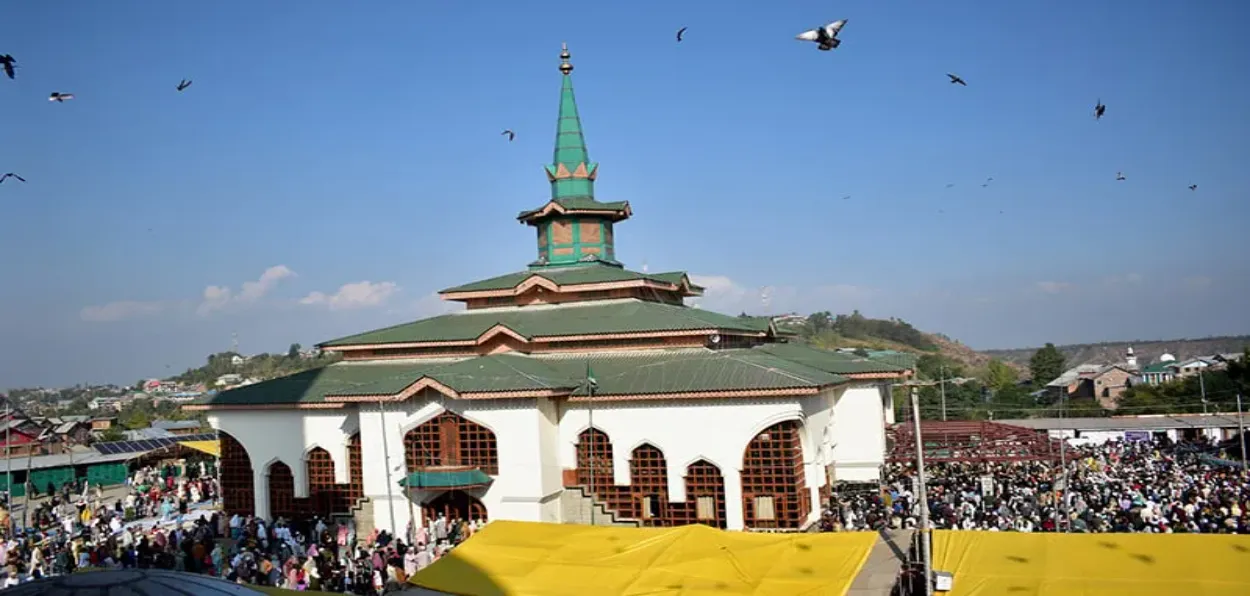
Ehsan Fazili/ Srinagar
Prof Farooq Fayaz Bhat, author and historian says that since over 80 percent of Kashmiri live in villages and are into agriculture, it’s just right that the Urs of Sheikh Nooruddin Wali, the founder of the Rishi cult (Sufi) and the Patron saint of Kashmir, be celebrated by his teachings which were not for the elitist but the common masses.
He was explaining the phenomenon of Noorudin Noorani’s Urs being celebrated last week, instead of on the date of his passing away. He said this fluctuation in the calendar of the Urs is in tune with the aspirations of people who are done with harvesting and therefore can visit the shrine for Urs.
“Sheikh-ul-Aalam gave religious philosophy based on the holy Quran and the Sunnah, aligned himself with the unlettered masses, and had a simple living in terms of dress and diet”, Farooq Fayaz commented. There was no reference to “Wazwan” or luxurious life with the Sufi saint, added Farooq Fayaz.
On the other hand, the elite and educated class knew two languages, Sanskrit and Persian, while the Sheikh represented the rural majority, who only spoke in their mother tongue. The rural majority would remain busy toiling for more than nine months but had sustenance only for three to four months a year, the historian commented.
People led by CM Omar Abdullah thronging the shrine
He said that October being towards the end of the harvest season of paddy, grains, and fruits, led to free time for over 90 percent of the rural folk. Elaborating on the sociological perspective, Prof Farooq Fayaz said that in the absence of cash, the rural masses had to resort to barter systems and “take asylum in the serene atmosphere of shrines”.
For the unlettered rural society, Sheikh Nooruddin Wali was Alamdaar-e-Kashmir (flag bearer of Kashmir), who would visit the shrines with all their offerings (in kind)”, the author said. The rural masses were “resourceful only in October” and thus, keeping in view the material, physical, and economical aspects has to be kept in mind.
For the past six decades, the practice of celebrating the life of Sheikh Nooruddin Noorani or Sheikh-ul-Aalam (1377 to 1440 AD) at the three-day Urs is being held in October every year, coinciding with the 26th day of the running Islamic month.
The Saint is revered as Alamdar-e-Kashmir, Nund Rishi, and Sheikh Noorudin Noorani. He lived for 63 years between the 10th of Dhul Hijjah 779 and 26 Jumada al-Thani 842 Hijri. He passed away on the 26th day of the month of Ramazan.
The Urs was organized on October 13 last year and October 23 in 2022.
The Urs began with the “Gilafbandi”, a change of sacred cloth on the graves of the saint and his followers on Monday, followed by night-long special prayers on Tuesday. The Urs was celebrated on Wednesday, 26th of Rabi ul Thani and the celebrations concluded with the following Friday prayers.
CM Omar Abdullah praying at the shrine
The Urs was earlier scheduled to be observed on September 30, coinciding with the 26th day of Rabial Awwal, of the Islamic calendar. However, on the recommendations of the J&K Wakf Board, it was rescheduled to be observed a month later on this day to fall in October.
The officials said that scheduling of the annual Urs had been worked out to be held in October, a practice for the past six decades, to avoid any inconvenience to the devotees during harsh winter conditions.
This schedule was adopted during the tenure of the former Prime Minister (as the head of the government was then called in J&K) Bakshi Ghulam Mohammad, who ruled J&K from 1953 to 1964.
On one such occasion, many devotees died due to harsh winter conditions prompting the authorities to devise a pragmatic approach to celebrating the Urs.
An official of the J&K Wakf Board told Awaz The Voice that October had been chosen for its moderate climate when farmers are free from the harvesting of paddy, apples, and other fruits.
Nund Rishi’s shrine, which is thronged by devotees daily, is also known for night-long prayers on Thursdays every week, attended by a larger number of pilgrims from all across the valley. This practice was restricted during Covid 19 period and has been restored over the last couple of years.
ALSO READ: Cultural assimilation of people comes alive in Asansol during Diwali
Sheikh-ul-Aalam is revered by both Muslims and Hindus for his eternal teachings. “His poetic expressions are universal. His guidance for a pious life is very impressive. His message of harmony and spiritual excellence is relevant everywhere and every time", Chairperson of J&K Wakf Board Dr Darakhshan Andrabi stated.
